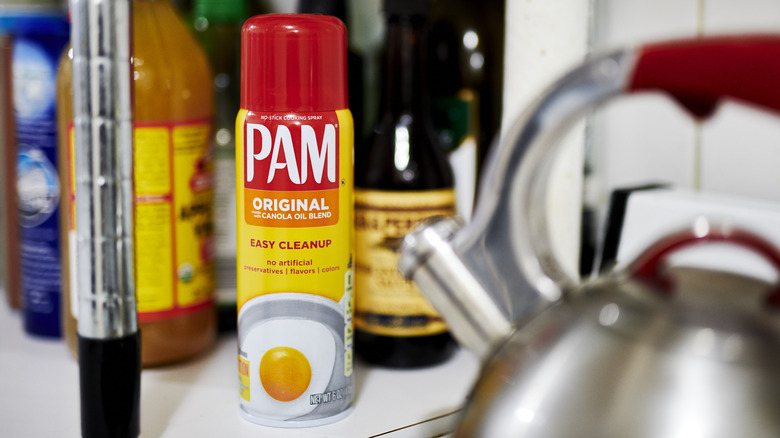The Hack That Uses A Kitchen Staple On A Stiff Lock
When you find a lock that's difficult to turn, cooking spray is a quick and handy solution. Cooking spray boasts multiple uses, with its role as a lubricant being a notable one. It's frequently preferred over commercial alternatives like WD-40 due to its perceived safety. That's because the primary ingredient in cooking spray is oil, which inherently possesses lubricating properties. This oil is adept at minimizing friction, allowing components to glide smoothly and alleviating stickiness. One of the significant advantages of cooking spray is its non-toxic nature. Since it's designed for culinary use, it's safe around food. In contrast, commercial lubricants, such as WD-40, can pose risks if accidentally consumed.
The convenience of cooking spray is another of its strengths. It's user-friendly and doesn't necessitate any specialized tools for application. When you are out of dedicated lubricants, a can of cooking spray can come to the rescue. Its versatility extends beyond the kitchen, making it a handy and safer lubricant alternative. So if your lock ever sticks or it feels stiff when turning, grab your trusty can. Here's how to utilize it to solve your problem.
How to use cooking spray to loosen a lock
You can loosen locks with cooking spray in a few simple steps. Before you begin, ensure the keyhole is free from any visible obstructions. Clean the exterior if necessary. Next, select your spray. While most cooking sprays will work, choosing one that's unflavored is best to avoid any residual scents. Then, hold the can a few inches away from the lock. Aim the nozzle directly at the keyhole and administer a short burst of spray. You don't need much; a little goes a long way. Insert your key into the lock. Instead of trying to turn it immediately, wiggle it from side to side several times. This action helps to spread the cooking spray evenly within the lock mechanism.
Next, try turning the key to unlock the door. Thanks to the lubricating qualities of the cooking spray, the lock should operate more smoothly, making the key easier to turn. After you're done, wipe away any excess spray from the lock and key with a clean cloth to prevent residue buildup. While cooking spray might not be a permanent solution for a problematic lock, it's a convenient and effective temporary fix.

